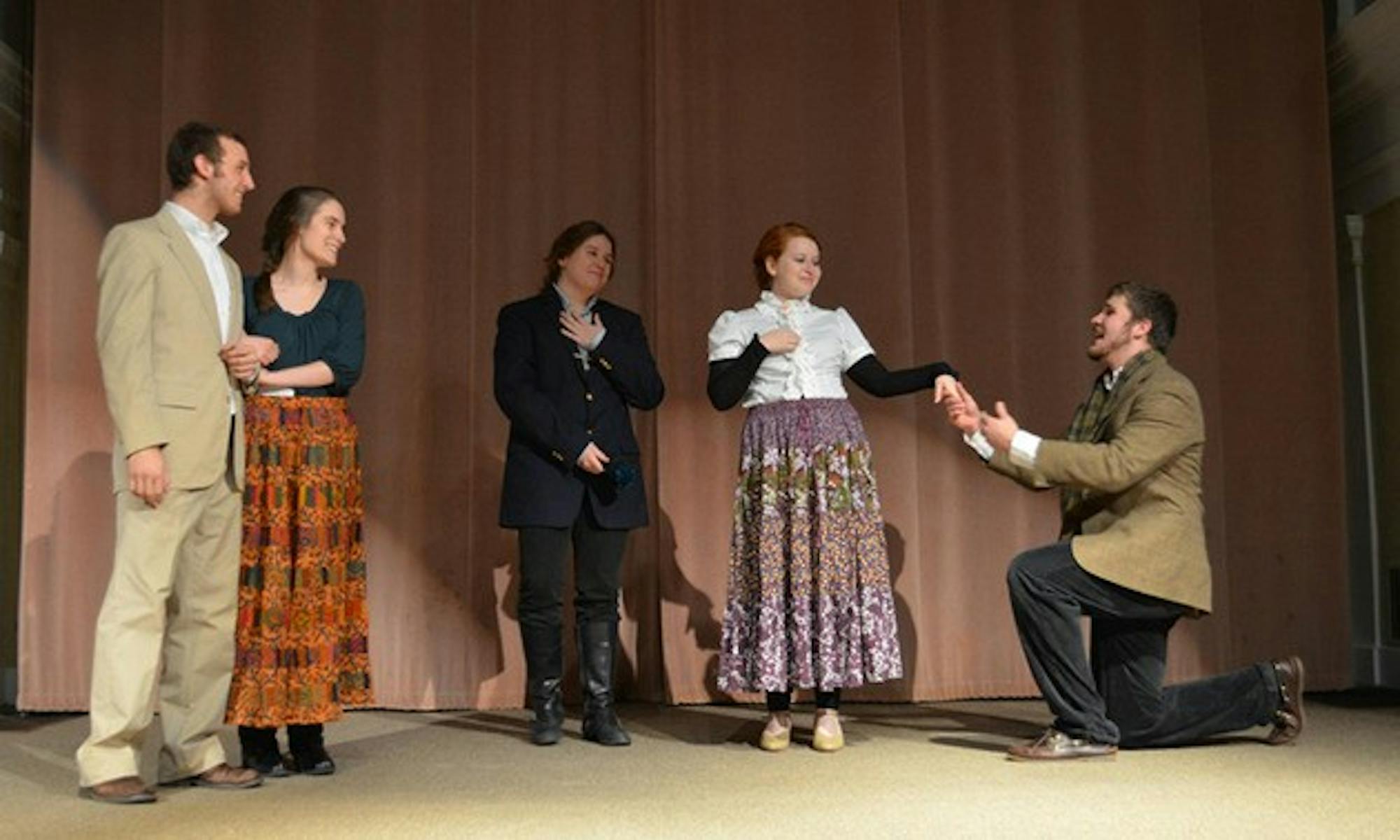"Rude Mechanicals is one of the only student theater groups on campus, so that's rare in and of itself, and it's definitely the only one that focuses on Shakespeare," member Michael Parets '14 said. "Having Shakespeare as the focal point of the group gives it a lot of direction."
With costumes straight out of the actors' closets and venues ranging from the Bema to Sigma Delta sorority to Moore theater, one thing never changes: members maintain a shared devotion to the Bard's immense body of work.
When reconceptualizing classics like "Much Ado About Nothing," "Hamlet" and "Twelfth Night," the Rude Mechanicals function autonomously like a theater company, taking care of stage management, directing, costume design and production. Without institutional support, the Rude Mechanicals work on and behind the stage, balancing odd jobs with acting. While many behind-the-scenes responsibilities used to fall under the domain of the company manager, the group has recently restructured to distribute tasks to different members.
"This term the company manager is now more overseeing everything," manager Stephanie Abbott-Grobicki '15 said. "We have someone else doing publicity, and we've elected an artistic director to oversee the directing, someone who can really answer the harder questions."
In previous years, the entire group poured over problematic moments in the show together. In a highly democratic and potentially chaotic process, "we would all direct each other," Abbott-Grobicki said. Because the group contains students with different theater backgrounds, members can often offer one another advice.
"It's usually the older, more experienced people giving direction to new members, and often it's textual," Patton Lowenstein '14 said.
The group dynamic proves essential, as the language of Shakespeare's plays, compared to modern English, requires a fair amount of deciphering before staging even enters the picture.
Luckily for the Rude Mechanicals, the oldest and most important member of the group has more artistic discretion than anyone else. Shakespeare himself makes many of the actor's hardest decisions for them.
"Shakespeare doesn't have the stage directions like a lot of modern plays do, so a lot of the movement comes out of the words."
By altering only the setting, the Rude Mechanicals continue to rely on the original text to make most of the artistic decisions.
That's not to say that the members aren't the driving creative force behind every production.
"It is a group of people who put on shows through a collaborative effort," Naomi Lazar '17 said. "It just sounded really cool, so I decided to audition."
The process of rehearsing and blocking each scene is thorough and prolonged. Actors involved in each scene rehearse independently, and all the company members provide feedback later on.
"A scene goes up during the week with a small group of people who are in the scene and an outside watcher," Parets said. "They work out blocking and a lot of the initial rehearsal problems, and [the] next week it will run in front of the entire cast where they will work out the problematic areas."
In this segmented process, company members spend a good deal of time collaborating, planning and performing together.
"It's a tight-knit group of people," Parets said. "It's rare to be able to interact with members of all classes who are currently on campus, becoming friends and working on projects together."
Two members from the Class of 2010, in fact, got engaged after graduation.
While the group might not always provide a romantic prospect, it is a source of support for company members, Abbott-Grocibki said.
"We really want to make sure that we are giving people roles that will push them and utilize their potential, so the leads are not always the most experienced," she said.
She recalled her own experience freshman year playing Olivia in "Twelfth Night," Shakespeare's gender-bending exploration of mistaken identity.
"As a freshman, you don't always get big roles in the theater department right away," she said. "It was terrifying to do it, but it really helped me grow as an actress."
Sometimes members are thrust into the spotlight under very different, not quite intentional, circumstances. A week before the group's production of "Twelfth Night," the lead actor broke his jaw playing rugby and had to have it wired shut. Though the part came with almost 500 lines, Luke Katler '15 memorized it in about a week so that the show could continue as planned. This collaborative spirit encourages members both with and without previous experience with Shakespeare to dive in headfirst.
With its unique openness to members and its audiences, the Rude Mechanicals have brought the men and women of Shakespearean England to the grassy, make-shift stages of Dartmouth College.
Katler is a member of The Dartmouth staff.




